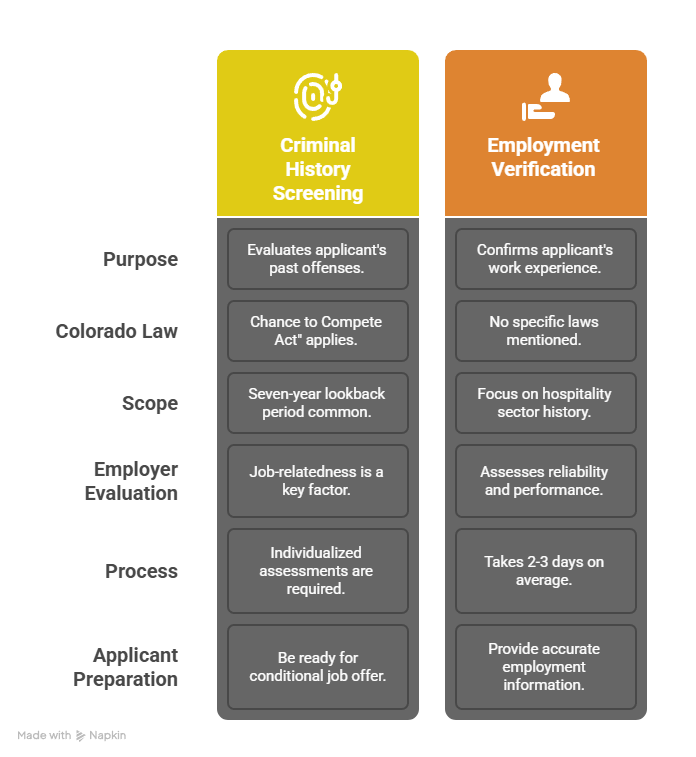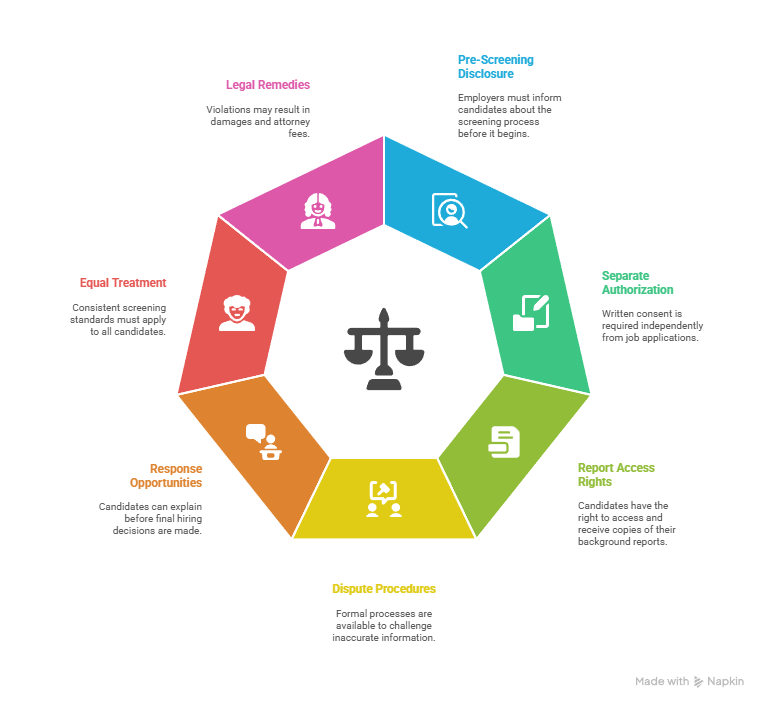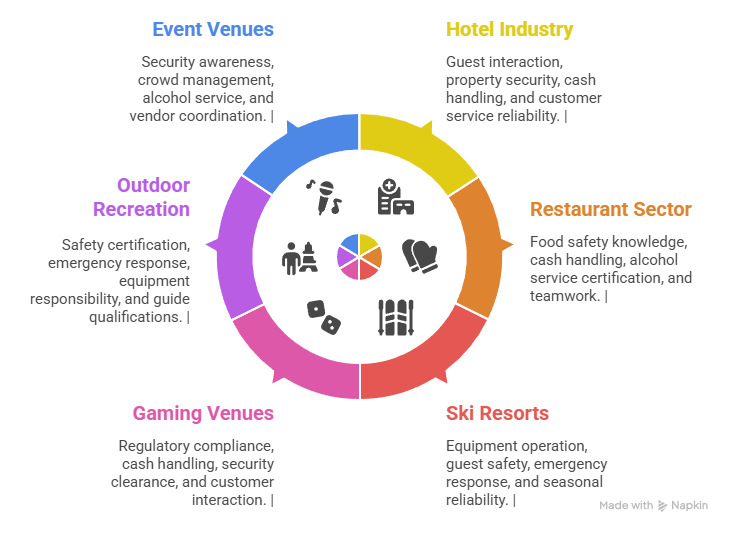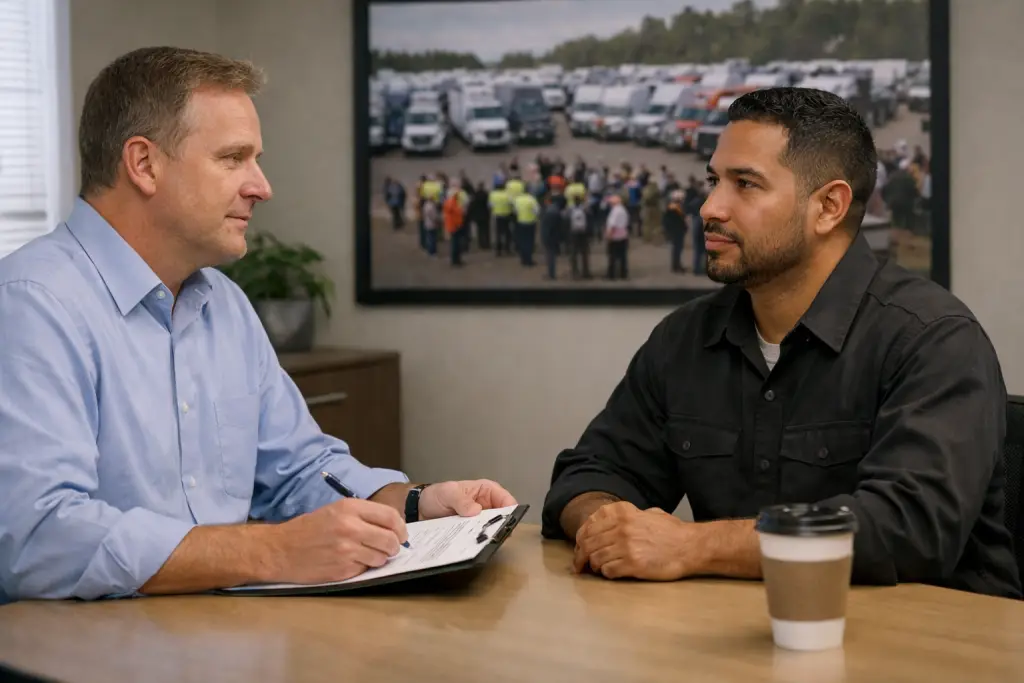Colorado hospitality background checks require careful navigation of state-specific laws, including cannabis legalization considerations and seasonal employment patterns unique to the ski and tourism industries. Understanding these requirements helps both job seekers and employers ensure compliant, efficient screening processes that support Colorado's thriving hospitality sector.
Key Takeaways
- Colorado law prohibits discrimination based on lawful off-duty cannabis use, significantly impacting hospitality background screening policies.
- Seasonal employment patterns in ski resorts and tourism create compressed hiring timelines requiring streamlined background check processes.
- The state's "ban-the-box" legislation limits when employers can inquire about criminal history during the application process.
- Denver and other municipalities have additional local ordinances that may affect hotel employment screening procedures.
- Background check processing times typically range from 24-72 hours for most hospitality positions in Colorado.
- Employers must provide clear disclosure and obtain written consent before conducting background screenings under FCRA requirements.
Understanding Colorado Hospitality Background Check Requirements
Colorado's hospitality industry operates under a unique regulatory framework. This framework balances worker protections with employer needs. The state's progressive employment laws create specific considerations for background screening. These laws affect hotels, restaurants, ski resorts, and tourism businesses.
The regulations have evolved significantly since cannabis legalization. Recent fair hiring legislation has also changed requirements. Colorado hospitality employers must stay current with these changes. Job seekers also benefit from understanding their rights under these laws.
The Colorado hospitality sector employs over 320,000 workers according to current industry data. This makes it one of the state's largest employment sectors. Background check compliance affects everyone from seasonal workers to management staff. Understanding these requirements protects both job seekers and employers from legal complications.
Federal laws still apply alongside state requirements. The Fair Credit Reporting Act (FCRA) governs background screening procedures. Equal Employment Opportunity Commission (EEOC) guidelines prevent discriminatory practices. However, Colorado's state-specific protections often provide additional worker safeguards.
The interaction between federal and state requirements creates complexity. Employers must navigate multiple regulatory layers. Job seekers need to understand their rights under both systems. This knowledge helps ensure fair treatment during the hiring process.
Types of Background Checks in Colorado Hospitality
Colorado hospitality employers use several types of background screening. Each type serves different purposes in the hiring process. Understanding these categories helps job seekers prepare appropriately. It also helps employers choose the right screening methods.
Criminal history screening remains the most common type. Employment verification follows as a close second. Some positions require additional specialized screening. These might include credit checks or professional license verification.
The scope of background screening varies by position. Entry-level roles typically require basic screening. Management positions often need more comprehensive checks. Safety-sensitive roles may have enhanced requirements.

Criminal History Screening
Colorado's "Chance to Compete Act" significantly impacts criminal background checks. This ban-the-box legislation protects job applicants with criminal histories. Employers with 11 or more employees cannot ask about criminal history on initial applications. They must wait until after making a conditional job offer.
The seven-year lookback period applies to most criminal records in Colorado. Certain serious felonies may appear indefinitely on background checks. Hospitality employers must consider job-relatedness when evaluating criminal history. This is particularly important for positions involving guest interaction or financial responsibilities.
Employers cannot automatically disqualify candidates based on criminal history. They must conduct individualized assessments. These assessments consider the nature of the crime, time elapsed, and job requirements. This approach gives candidates with minor criminal histories fair consideration.
Employment Verification
Prior work history verification remains standard practice across Colorado hospitality. Ski resorts and hotels frequently verify previous seasonal employment. The industry's transient workforce makes this verification especially important. Reference checks help employers assess reliability and performance in customer service roles.
Many Colorado hospitality businesses participate in industry-specific databases. These databases track employment history within the hospitality sector. This collaboration helps identify qualified candidates quickly. It also helps identify those with performance issues across different properties.
Employment verification typically takes 2-3 business days to complete. Some employers offer expedited processing for urgent hiring needs. Job seekers should prepare accurate employment information to avoid delays. Having supervisor contact information readily available helps speed the process.
Cannabis and Colorado Hospitality Employment
Cannabis legalization creates unique considerations for Colorado hospitality background checks. While marijuana use is legal for adults 21 and older, employers retain certain rights. They can maintain workplace policies regarding impairment and safety. The hospitality industry must balance guest safety with employee privacy rights.
Colorado's Lawful Off-Duty Activities Statute protects employees from discrimination. This law covers lawful activities outside work, including cannabis use. However, employers can still prohibit on-duty impairment. They can also maintain drug-free workplace policies for safety reasons.
Federal regulations complicate this landscape for certain positions. Jobs involving transportation often fall under federal requirements. Hotel positions involving federal contracts must comply with federal drug testing requirements. These rules apply regardless of state cannabis laws.
| Position Category | Cannabis Considerations | Testing Requirements |
| Guest Services | Off-duty use protected | Pre-employment screening only |
| Food & Beverage | Off-duty use protected | Reasonable suspicion testing |
| Housekeeping | Off-duty use protected | Pre-employment screening only |
| Maintenance | Safety-sensitive roles | Enhanced pre-employment and random |
| Transportation | Federal regulations apply | Mandatory pre-employment and random |
| Security | Safety-sensitive designation | Comprehensive screening permitted |
| Management | Off-duty use protected | Policy enforcement responsibilities |
Understanding these distinctions helps both employers and job seekers navigate screening requirements. Clear policies protect everyone involved in the employment relationship. Regular policy updates ensure compliance with evolving regulations.
Seasonal Employment and Background Checks
Colorado's tourism industry relies heavily on seasonal employment. This creates unique challenges for background screening processes. Ski resorts typically operate from November through April. Summer tourism businesses peak from May through September.
Seasonal hiring creates compressed timelines for recruitment and screening. Employers must balance speed with thoroughness in their background check processes. Many businesses begin screening early to avoid delays. Some use conditional offers to expedite the hiring process.
The high volume of seasonal hiring can strain background check resources. Processing times may extend during peak hiring periods. Job seekers should apply early to allow adequate time for screening. Employers should plan their hiring timelines accordingly.
Ski Resort Hiring Challenges
Colorado ski resorts face unique background check challenges during hiring seasons. Most resorts hire 60-80% of their workforce within 6-8 week periods. This creates pressure for expedited background screening while maintaining thorough vetting. The compressed timeline requires efficient processes and clear communication.
Many ski resorts begin background check processes early in recruitment cycles. Some properties pre-screen candidates through conditional offers. This allows background checks to process while finalizing other employment requirements. The approach helps manage volume while ensuring compliance with state timing requirements.
Ski resort positions often involve unique risk considerations. Lift operators work with heavy machinery and guest safety. Food service workers handle large volumes during peak periods. Guest services staff manage high-value transactions and equipment rentals.
Summer Tourism Staffing
Colorado's summer tourism season presents different background check considerations. Hotels, restaurants, and outdoor recreation businesses increase staffing for peak months. Background check volumes surge during March and April as businesses prepare. The season typically runs longer than winter tourism.
Summer positions often involve different risk profiles than winter employment. Outdoor recreation companies may emphasize safety-related background elements. Hotels focus on guest interaction and property security considerations. Restaurant employers prioritize food safety and cash handling reliability.
The diverse nature of summer tourism creates varied screening requirements. Adventure tour companies need different checks than luxury hotels. Understanding these differences helps job seekers target appropriate opportunities. It also helps employers design effective screening programs.
Denver Hotel Employment Screening Specifics
Denver's local ordinances add layers to hotel employment screening beyond state requirements. The city's Fair Chance Employment Act provides extra protections for individuals with criminal histories. Hotel employers must conduct individualized assessments rather than blanket exclusions. They must document their decision-making processes when criminal history influences hiring.
The Denver metropolitan area hosts numerous major hotel chains and independent properties. Each property may have varying background check policies within legal limits. Many properties align screening with corporate standards while ensuring local compliance. This creates opportunities for job seekers to understand different employers' approaches.
Denver's competitive hospitality job market has led employers to streamline processes. Many hotels want to secure qualified candidates quickly before competitors do. Some properties offer provisional employment pending background check completion. However, this requires careful policy development to ensure compliance and risk management.
| Hotel Type | Typical Screening Requirements | Processing Timeline |
| Luxury Hotels | Comprehensive criminal, employment, credit | 5-7 business days |
| Business Hotels | Criminal, employment, reference checks | 3-5 business days |
| Extended Stay | Criminal, employment, rental history | 3-5 business days |
| Budget Hotels | Basic criminal and employment | 1-3 business days |
| Boutique Hotels | Criminal, employment, cultural fit assessment | 3-5 business days |
This competitive environment benefits job seekers with clean backgrounds. It also provides opportunities for those with minor criminal history through individualized assessments. Understanding each hotel segment's typical requirements helps candidates target appropriate opportunities.
Background Check Processing and Timelines
Colorado hospitality background checks typically process within specific timeframes. Standard screenings usually complete within 24-72 hours. Comprehensive checks may require 5-7 business days for completion. Processing speed varies based on screening scope and court accessibility.
Electronic database searches provide immediate results for most components. Criminal records and basic employment history process quickly. However, verification of education credentials may take longer. Out-of-state records can extend processing timelines significantly.
Seasonal hiring periods can create processing delays due to increased volume. All Colorado hospitality employers compete for screening resources during peak times. Planning background checks early in recruitment cycles helps avoid delays. Some employers use conditional offers to begin screening while continuing candidate evaluation.
| Screening Component | Standard Timeline | Rush Processing Available |
| Colorado Criminal Records | 24-48 hours | Same day available |
| Multi-State Criminal | 2-4 days | 24-48 hours |
| Employment History | 2-3 days | 24 hours |
| Education Verification | 3-5 days | 1-2 days |
| Professional Licenses | 1-3 days | Same day |
| Reference Checks | 2-4 days | 24-48 hours |
| Credit Reports | 24 hours | Same day |
Rush processing options are available for urgent hiring needs. Additional fees typically apply for expedited services. Job seekers should respond promptly to screening requests to avoid delays. Complete and accurate information helps ensure smooth processing.
Job Seeker Rights and Protections
Colorado job seekers have substantial rights during hospitality background check processes. These rights exceed federal minimum requirements in many areas. Employers must provide clear written disclosure before conducting background checks. They must also obtain separate written authorization from candidates.
The disclosure must be a standalone document. It cannot be buried within employment applications or other materials. This ensures candidates understand exactly what screening will occur. Clear disclosure helps prevent misunderstandings and legal complications.
Applicants have rights to receive copies of background reports. They can dispute inaccurate information through formal processes. If adverse employment decisions result from background checks, employers must provide notices. These pre-adverse action notices allow candidates to respond before final decisions.
Colorado's anti-discrimination laws protect candidates from unfair screening practices. Employers cannot use different background check standards for different candidates. Business necessity must justify any variations in screening requirements. Understanding these protections helps job seekers advocate for fair treatment.

- Pre-Screening Disclosure: Employers must explain what background screening includes before conducting checks
- Separate Authorization: Written consent must be obtained independently from job applications
- Report Access Rights: Candidates can request and receive copies of their background reports
- Dispute Procedures: Formal processes exist to challenge inaccurate background information
- Response Opportunities: Pre-adverse action notices allow explanations before final hiring decisions
- Equal Treatment: Consistent screening standards must apply to all candidates for similar positions
- Legal Remedies: Violations may result in damages and attorney fees for affected candidates
These protections create accountability for employers throughout the screening process. They ensure qualified candidates aren't unfairly eliminated due to errors or discrimination. Job seekers should understand these rights and exercise them when necessary.
Common Background Check Issues and Solutions
Colorado hospitality job seekers occasionally encounter background check issues. Understanding common problems helps candidates prepare and respond appropriately. Most issues stem from inaccurate information or outdated records. Proactive preparation can prevent many complications.
Name variations can cause confusion in background screening. Married names, maiden names, and nicknames may create discrepancies. Job seekers should provide complete name history to avoid delays. This includes any legal name changes or variations used in previous employment.
Address history affects the scope of criminal background checks. Incomplete or inaccurate address information can miss relevant records. It can also trigger searches in wrong jurisdictions. Providing complete address history for the past seven years ensures thorough screening.
- Incorrect Personal Information: Verify all names, dates, and addresses before submission
- Outdated Criminal Records: Records beyond seven years should not appear for most positions
- Employment Date Discrepancies: Ensure employment dates match across all application materials
- Educational Institution Changes: Verify current names and contact information for schools
- Reference Availability: Confirm references are reachable and willing to provide information
Common issues have straightforward solutions when addressed promptly. Job seekers should review their background information before applying. Employers should provide clear processes for resolving discrepancies. Open communication prevents minor issues from derailing employment opportunities.
Compliance Best Practices for Employers and Job Seekers
Successful background screening requires cooperation between employers and job seekers. Both parties have responsibilities in ensuring compliant, efficient processes. Understanding these responsibilities promotes positive outcomes for everyone involved. Clear communication and proper documentation prevent most compliance issues.
Colorado hospitality employers must maintain detailed documentation of screening policies. Consistent application of screening criteria demonstrates compliance with anti-discrimination laws. Regular policy updates ensure alignment with evolving state and local requirements. Training hiring managers on proper procedures reduces legal risks.
Job seekers can take proactive steps to ensure smooth background screening. Obtaining personal background reports before job searching helps identify potential issues. Many screening companies offer consumer reports that mirror employer checks. This preparation allows candidates to address problems before they affect employment opportunities.
Employer Responsibilities
Colorado hospitality employers have specific obligations during background screening processes. They must provide proper disclosure and obtain written consent before screening. The screening must be relevant to job requirements and consistently applied. Documentation of decision-making processes protects against discrimination claims.
Training hiring managers on background screening law prevents compliance violations. Many employers invest in compliance software or third-party screening services. These tools ensure consistent processes and proper documentation. Regular legal updates help employers stay current with changing requirements.
Employers must follow proper adverse action procedures when background checks influence hiring decisions. This includes pre-adverse action notices and final adverse action letters. Candidates must have opportunities to respond before final decisions. These procedures protect both employers and job seekers.
Job Seeker Preparation
Proactive preparation helps Colorado hospitality job seekers navigate screening successfully. Reviewing personal background information before applying prevents surprises. Job seekers should gather employment history, education records, and reference information. Complete and accurate information speeds the screening process.
Honest disclosure of background issues, when legally required, often produces better outcomes. Colorado's individualized assessment requirements mean many issues don't automatically disqualify candidates. Proper explanation and context can overcome minor criminal history concerns. Attempted concealment typically creates bigger problems than the original issues.
Job seekers should understand their rights during the background screening process. They can request copies of background reports and dispute inaccurate information. Understanding timing requirements helps candidates plan their job search appropriately. Knowledge of local laws provides additional protections beyond federal requirements.
Industry-Specific Considerations
Different segments of Colorado's hospitality industry have varying background check requirements. Hotels may focus on guest interaction and property security concerns. Restaurants often emphasize food safety and cash handling reliability. Ski resorts consider equipment operation and guest safety responsibilities.
Gaming establishments have additional regulatory requirements beyond standard hospitality screening. Liquor-serving establishments may have specific state licensing requirements. Understanding these industry segments helps job seekers target appropriate opportunities. It also helps employers design effective screening programs.
The outdoor recreation segment of Colorado tourism has unique considerations. Adventure tour operators need guides who can handle emergency situations. Equipment rental companies must trust employees with valuable gear. These businesses often emphasize safety records and reliability in their screening.

- Hotel Industry: Guest interaction, property security, cash handling, and customer service reliability
- Restaurant Sector: Food safety knowledge, cash handling, alcohol service certification, and teamwork
- Ski Resorts: Equipment operation, guest safety, emergency response, and seasonal reliability
- Gaming Venues: Regulatory compliance, cash handling, security clearance, and customer interaction
- Outdoor Recreation: Safety certification, emergency response, equipment responsibility, and guide qualifications
- Event Venues: Security awareness, crowd management, alcohol service, and vendor coordination
Each segment has developed screening practices that address its specific risks and requirements. Job seekers benefit from understanding these differences when applying. Employers can learn from other segments while developing their own screening programs.
Conclusion
Colorado hospitality background checks require understanding of complex regulations that prioritize worker protections. Cannabis legalization, ban-the-box legislation, and seasonal employment patterns create unique considerations for the industry. Success depends on staying current with evolving laws and implementing compliant screening processes. Both job seekers and employers benefit from understanding their rights and responsibilities in this evolving landscape. Colorado's progressive approach to employment law continues developing, making ongoing education essential for all hospitality industry participants.
Frequently Asked Questions
How long do Colorado hospitality background checks take?Â
Most Colorado hospitality background checks complete within 24-72 hours for standard screenings. Comprehensive checks including education and detailed employment verification may require 5-7 business days. Rush processing is available for urgent hiring needs with additional fees.
Can Colorado hospitality employers ask about cannabis use?Â
Colorado employers cannot discriminate based on lawful off-duty cannabis use, but can maintain drug-free workplace policies and test for impairment. Safety-sensitive positions may have different requirements, and federal regulations still apply to certain transportation and federal contract roles.
What criminal history can Colorado hospitality employers consider?Â
Colorado's seven-year lookback period applies to most criminal records. Employers must conduct individualized assessments considering job-relatedness rather than blanket exclusions. Ban-the-box laws prohibit criminal history inquiries until after conditional job offers for employers with 11+ employees.
Are Denver hotel employment screening requirements different?Â
Denver has additional local ordinances including the Fair Chance Employment Act that provides extra protections for individuals with criminal histories. Hotels must comply with both state and local requirements, often requiring more detailed documentation of hiring decisions and individualized assessments.
What rights do Colorado job seekers have during background screening?Â
Job seekers have rights to written disclosure, separate consent forms, copies of background reports, dispute procedures for inaccurate information, and pre-adverse action notices. Colorado provides stronger protections than federal minimum requirements, including consistent screening standards for all candidates.
Do Colorado ski resorts have special background check requirements?Â
Ski resorts follow standard Colorado employment screening laws but often have compressed hiring timelines due to seasonal staffing needs. Some positions involving transportation or equipment operation may have enhanced safety requirements, and federal regulations may apply regardless of state cannabis laws.
Additional Resources
- Colorado Department of Labor and Employment - Fair Hiring Practices
https://cdle.colorado.gov/employers/fair-hiring-practices - Colorado Civil Rights Division - Employment Discrimination
https://ccrd.colorado.gov/employment-discrimination - Federal Trade Commission - Using Consumer Reports for Employment
https://www.ftc.gov/business-guidance/resources/using-consumer-reports-employment-what-employers-need-know - Colorado Revised Statutes - Lawful Off-Duty Activities
https://leg.colorado.gov/sites/default/files/documents/2019A/bills/2019a_1025_signed.pdf - Denver Fair Chance Employment Act Information
https://www.denvergov.org/Government/Agencies-Departments-Offices/Civil-Rights - Colorado Restaurant Association - Employment Resources
https://www.coloradorestaurant.com/employment-resources - Colorado Hotel and Lodging Association - Industry Guidelines
https://www.chla.com/industry-resources - Equal Employment Opportunity Commission - Background Checks
https://www.eeoc.gov/laws/guidance/background-checks-what-employers-need-know

GCheck Editorial Team
Meet the GCheck Editorial Team, your trusted source for insightful and up-to-date information in the world of employment background checks. Committed to delivering the latest trends, best practices, and industry insights, our team is dedicated to keeping you informed.
With a passion for ensuring accuracy, compliance, and efficiency in background screening, we are your go-to experts in the field. Stay tuned for our comprehensive articles, guides, and analysis, designed to empower businesses and individuals with the knowledge they need to make informed decisions.
At GCheck, we're here to guide you through the complexities of background checks, every step of the way.






